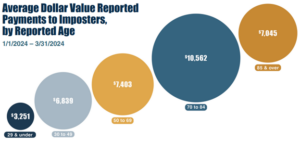Social Security’s Office of the Inspector General Releases Scam Report to Congress
Reading Time: 2 MinutesLast Updated: July 18, 2024
 Social Security’s Office of the Inspector General (OIG) recently released its quarterly Scam Report to Congress. The report provides information about scam trends in the second quarter of Fiscal Year 2024 (January 1 — March 31, 2024).
Social Security’s Office of the Inspector General (OIG) recently released its quarterly Scam Report to Congress. The report provides information about scam trends in the second quarter of Fiscal Year 2024 (January 1 — March 31, 2024).
“As public servants, we must use every tool at our disposal to raise awareness and protect the American people against Social Security imposter scams,” Commissioner Martin O’Malley said earlier this year when announcing the 5th annual “Slam the Scam” Day.
Our 2024 anti-scam strategy expands education and outreach efforts to underserved and tribal communities.
Scam reports to OIG have significantly declined in the past few years. However, OIG continues to receive complaints about scammers impersonating Social Security and OIG employees via phone calls, texts, emails, social media, and U.S. mail.
Government imposters try to steal money or personal information from potential victims by contacting them about fake Social-Security related problems.
OIG received about 27,000 scam allegations in the second quarter:
- About 45% of reported cases claimed there was a problem with a person’s Social Security number.
- Nearly 17% of cases mentioned a problem with Social Security benefits.
- One-third of scams used official-looking documents or images (such as the Social Security logo).
Scammers target people of all ages. More people 50 and older lost money to government imposter scams than those under 50, according to the report. Older adults ages 70 to 84 reported the largest payments to imposters — an average loss of $10,562.

What You Can Do
To learn how to protect yourself and your loved ones, visit our Protect Yourself from Scams page. If you receive a suspicious call, text, email, social media message, or letter from someone claiming to be from Social Security:
- Remain calm. If you have a strong emotional response to the communication, take a deep breath. Talk to someone you trust.
- Hang up or ignore the message. Do not click on links or attachments.
- Protect your money. Scammers often insist they can resolve a Social Security-related problem if you pay them with a gift card, prepaid debit card, cryptocurrency, wire transfer, money transfer, or cash. These forms of payment are hard to trace.
- Safeguard your sensitive information. Don’t provide personal information to someone who contacts you claiming to be from a government or law enforcement agency, even if they know some details about you. If we need to reach you, we will mail you a letter.
- Report the scam. Use our online form to report the scam to OIG.
- Spread the word. Share your knowledge about scams and how to avoid them. Especially in underserved and tribal communities, which may not have outreach programs, you can be the link to help protect others from becoming victims.
Please share this message on social media, with friends, family, and local organizations.
Did you find this Information helpful?
Tags: equity, scams, Social Security benefits
See CommentsAbout the Author
Comments
Leave a Comment
Please review our Comment Policy before leaving a comment. For your safety, please do not post Personally Identifiable Information (such as your Social Security Number, address, phone number, email address, bank account number, or birthdate) on our blog.

John F.
Scam prevention article very beneficial and helpful!
Horace V.
Where can EE look up known and currently active scam? If not provided, it would probably be a good idea to do so.
Lynne W.
I had a scam with social security which I immediately called the main office and was told that Social Security never sends a letter via email. They will only send a document via mail to your home address. They also told me to just ignore it and do not open the PDF file they sent via email either. They were very helpful and kind.
It’s so frustrating because everyone wants to scam you out of your monies know a days!
Joseph B.
Thank you SSN for looking out for us.
Back in 1959 I got my 1st job working in a grocery store at $1.25 per hours when I was 15 1/2 years old.
When I got my 1st paycheck after working 20 hours part time the dollar amount was less than the $25 I had calculated as my earnings.
My manager told me, “Don’t worry kid. You earned $25, but we took out some for your Social Security Program. You will get it all back when you are old and retired.
50 years later I retired and am thoroughly pleased with my Social Security Retirement income. SSN helps make life worth living.
Thank you SSN.
And thanks for helping to keep evil people from stealing retired individuals hard earned SSN income safe.
jgb
Ashley
I think it’s sad that we can’t even get ahold of anyone to help when they all of a sudden delete are info or change it and when they mess up it’s like u have y start all over I gave them all my kids information they never even turned it in there is no trust for the gov there corrupt no accountability no one even cares to go there job just call this num or this num
Donna P.
What are you doing about the false advertising about extra payments and checks being sent out to folks on SS,SDI, and other related Ss Payments? It’s not true and that information needs to be taken down. Does Biden realize he is being used on those false advertisements. Or is it part of his campaign to win votes? Shame on him!
Phil
I tried leaving a comment but it kept cycling on I’m not a robot.
About C.
Thank you all at the SSI for your efforts to give us the information to make sure we are NOT “scam”. I like the round circles, that helps a lot to see what group most often gets scam. Please keep up the good work and ahead of the scammers on the planet earth.
David S.
I am a victim of scammers. They broke into my retired military pay account and changed my direct SSA deposit to another bank. I called SSA and they resolved the problem.
Oscar N.
Thank you